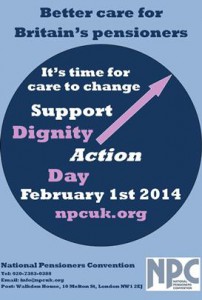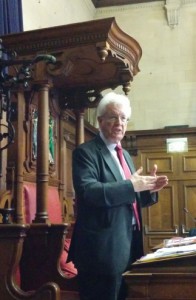 I attended this event today as Deputy Lord Mayor and was very pleased to open it with a few words of support and thanks. It was a joint event of the Oxfordshire Unison Retired Members branch, the National Pensioners Conference and the Oxfordshire Pensioners Action Group.
I attended this event today as Deputy Lord Mayor and was very pleased to open it with a few words of support and thanks. It was a joint event of the Oxfordshire Unison Retired Members branch, the National Pensioners Conference and the Oxfordshire Pensioners Action Group.
The most inspirational speaker was Rodney Bickerstaffe (pictured), a former president of the National Pensioners Convention, and I really enjoyed his message and the passion with which he delivered it.
We all know that we are an ageing nation – thanks to improved lifestyles and improved health care people are living longer. Many people who are past working age give a huge amount to our City and beyond in the stunning amount of voluntary work they do and I am hugely grateful for that.

I firmly believe that those of us of working age or younger have a duty to ensure proper dignity for older people all around us. Dignity throughout life is so important to health and well-being and it gets no less important later in life. Any type of age-based discrimination is utterly unacceptable in our society and I think the Dignity Code encompasses that extremely well. The Dignity Code is an excellent guide for everyone in any interactions they have with older people and I hope will be extremely useful – I will certainly be using it in my future thinking and planning as a councillor.
As I think it’s so useful, here’s the Dignity Code in full:
The purpose of this Dignity Code is to uphold the rights and maintain the personal dignity of older people, within the context of ensuring the health, safety and well being of those who are increasingly less able to care for themselves or to properly conduct their affairs.
This Code recognises that certain practices and actions are unacceptable to older people, such as:
• Being abusive or disrespectful in any way, ignoring people or assuming they cannot do things for themselves
• Treating older people as objects or speaking about them in their presence as if they were not there
• Not respecting the need for privacy
• Not informing older people of what is happening in a way that they can understand
• Changing the older person’s environment without their permission
• Intervening or performing care without consent
• Using unnecessary medication or restraints
• Failing to take care of an older person’s personal appearance
• Not allowing older people to speak for themselves, either directly or through the use of a friend, relative or advocate
• Refusing treatment on the grounds of age
This Code therefore calls for:
• Respect for individuals to make up their own minds, and for their personal wishes as expressed in ‘living wills’, for implementation when they can no longer express themselves clearly
• Respect for an individual’s habits, values, particular cultural background and any needs, linguistic or otherwise
• The use of formal spoken terms of address, unless invited to do otherwise
• Comfort, consideration, inclusion, participation, stimulation and a sense of purpose in all aspects of care
• Care to be adapted to the needs of the individual
• Support for the individual to maintain their hygiene and personal appearance
• Respect for people’s homes, living space and privacy
• Concerns to be dealt with thoroughly and the right to complain without fear of retribution
• The provision of advocacy services where appropriate
